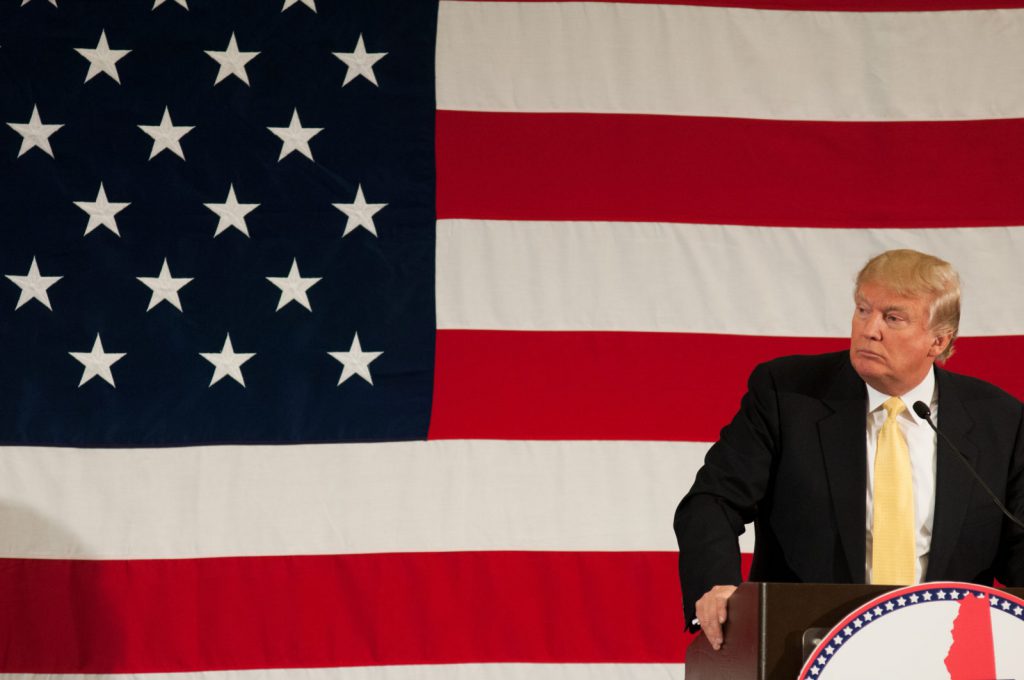
Published March 7, 2016
EPPC Senior Fellow Peter Wehner talked with Washington Post columnist Jennifer Rubin about Donald Trump’s apparent widespread support among evangelical voters. This interview originally appeared in two parts (part 1 here; part 2 here). The introductory text is Ms. Rubin’s.
As stunning to me as the widespread Republican support for Donald Trump — an opportunist, a know-nothing, a recent Democratic donor — may be, nothing has been as perplexing as is the widespread support for Trump among evangelicals, as evidenced by his wins in Louisiana and Kentucky on Saturday. How could a vulgar, thrice-married billionaire whose bullying and nastiness have driven the presidential contest into the rhetorical gutter get the support of people of faith?
I am not Christian, let alone an expert in the evangelical community, so I reached out to my longtime friend Peter Wehner, who has thought and written extensively about the intersection of faith and politics. (He, along with my colleague Michael Gerson, wrote the indispensable “City of Man” a few years ago, a must-read on the subject.)
RUBIN: Where are the values voters when you need them? I’m mystified Trump is getting so much support from genuinely religious people while spewing hatred. What is going on here?
WEHNER: It’s a great question, and a mystery to many of us who are evangelical Christians and social conservatives. I’ll answer that in a moment but let me say at the outset, it’s important to point out that while Donald Trump is winning a plurality of self-described evangelical voters in many states, the term “evangelical voter” is somewhat elastic. For some, it’s a kind of broad cultural identification; for others, it refers to a creedal faith. Those in the latter camp are more faithful churchgoers – and that group tends to be less supportive of Donald Trump. To put it another way: The un-churched are more supportive of Trump than regular churchgoers.
In addition, impressive and important voices in the evangelical world like Russell Moore and Max Lucado are speaking out against Trump, and I imagine more will follow. I’ve heard from many evangelicals who are pained and alarmed at the rise of Trump and Trumpism.
RUBIN: That’s worth keeping in mind. Still, a large number of evangelicals are supporting Trump. How do you explain that?
WEHNER: It’s complicated, and among the tentative explanations I’ve come up with, based in part on personal interaction with others and in part based on my survey of stories and the data, is that some blue-collar, non-college educated Christians — like blue-collar, non-college educated non-Christians — are drawn to Trump’s positions on trade and illegal immigration.
In addition, many Trump supporters who are self-described evangelicals are terribly worried about the state of America, enraged at the so-called “Republican establishment,” and feeling increasingly powerless and desperate. There’s also a growing grievance culture among some on the right, and Trump gives voice to those grievances, their bitterness, their anger. They have in a sense given up on traditional politics and the political system, and so they find themselves supporting someone they believe will overthrow the tables in the temple courts.
He may be a wrecking ball, but he’s wrecking what deserves to be wrecked, in their minds.
Beyond that, I think many on the right — including people on the Christian right — are caught up in the Trump persona. They believe he’s the epitome of strength, of power, of kick-ass toughness.
“I think we have likely slipped past the point of no return as a country and I’m desperately hoping for a leader who can turn us around,” one evangelical wrote me. “I have no hope that one of the establishment guys would do that. That, I believe, is what opens people up to Trump.”
These people feel increasingly disrespected and beaten down, and they see Trump as fighting the very elites they believe, with some reason, has disparaged and disrespected them. He might not share their faith or embody moral virtue — he may even be a moral degenerate — but he’s our moral degenerate. He’s fighting political correctness like we wish we could.
RUBIN: The embrace of a crude, arrogant bully by people of deep Christian faith is not what most of us expected.
WEHNER: Nor did I. It’s all very odd and worrisome, since many faith voters — like many conservative Trump supporters — are jettisoning long-held convictions in order to rally around Trump. There’s a cult of personality involved here. And Trump himself — rude, vulgar, cruel, crude, narcissistic — is having a corrosive effect on our civic culture, which “values voters” once claimed to care for. People who once argued that moral character mattered in leaders are sympathetic to a man who is genuinely proud of his vices, who celebrates them. Christians are facilitating what Nietzsche called the transvaluation of values, paving the way for the Will to Power. So this is a very strange moment.
RUBIN: That all makes perfect political sense, but I am still surprised that there was not more reticence about Trump. Trump is bigoted, crude, mean and dishonest and yet people of faith seem not to care. “Values” used to mean humility, kindness, self-discipline and so on. Yet Trump sneers at these values. I don’t mean to be flip, but I expected more from Christians. Have secular trends including the degeneration of popular culture afflicted evangelicals as well?
WEHNER: I don’t mean to be flip, but I expected more from Christians, too!
Your observation is a good one. We’re all products of our cultural environment — and we’re all tainted by it. If the lake is polluted, all the fish that swim in it, regardless of the species, are affected. To be sure, Christians are called to offer an alternative to the world, including a different way of looking at things. “Do not conform to the pattern of this world,” St. Paul wrote in Romans, “but be transformed by the renewing of your mind.” At the same time, Christians believe everyone, including those of the Christian faith, are fallen. Our lives are broken in many areas. None of us is insulated from having our thoughts corrupted; none of us is fully redeemed.
Still, the resonance Mr. Trump has with some Christians is rather stunning to me, for the reasons you say. Jerry Springer said the other day that the Trump show was too juvenile and offensive even for him. That tells you how dramatically things have fallen.
Donald Trump isn’t responsible for our cultural rot, but he is helping to spread it in ways that were once unimaginable. And it’s not just one thing with Trump; it’s the whole ugly, packaged deal — the crudity and vulgarity, the vindictiveness and ease with which he lies, the unprincipled stands and staggering shallowness on issues, the erratic behavior and vanity, the open admiration for tyrants and slandering of America, the utter indifference to justice, the belief that might makes right, the contempt for the weak and powerless, the cruel mockery even of people with disabilities. The fact that people of the Christian faith aren’t repelled by this, or are even draw to him, is difficult to comprehend.
Not long ago I posed a question to a close friend of mine, who is not of the Christian faith, asking him why he thought evangelical Christians shouldn’t support Mr. Trump. He told me that as a general matter he’d say evangelicals value some character traits in leaders — moral uprightness, compassion, honesty, fidelity, godliness — and value some substantive commitments in politics: the defense of the unborn, concern for the poor, prioritization of religious liberty, and a grasp of the moral foundations of our society. He quickly added that there has probably been no major party candidate for national office in the history of the United States who has so thoroughly failed both sets of tests at once and has so embodied in his personal life and in his work what social conservatives believe is wrong with modern America. That sounds right to me.
Because I do think it’s important, I do want to re-emphasize that many evangelical Christians are taking a stand against Trump for reasons that are tied to their faith, and that shouldn’t be overlooked.
Let me say just one other thing: The people in my life whose faith commitments I most respect by and large share my views of Mr. Trump. But some of my friends, including those of the Christian faith, don’t. When I see Mr. Trump I see one thing; when many of my fellow evangelicals see him, they see something very different. I look at Trump I see a person running a malicious and deeply destructive campaign; when they see Trump they see someone who will be beat the political establishment, which they hate, into submission. That is so important to them — their rage is so overwhelming, their sense of injury and grievances so powerful — that they are willing to give Mr. Trump a pass on almost everything else that usually matters to them.
I think they’re wrong to do so — that they’re suspending their moral faculties to support a fraud, a con artist, a carnival barker — and I think in doing so their faith witness is being damaged. That when non-Christians see people like Jerry Falwell, Jr. lining up to support Mr. Trump and people like Mike Huckabee defend him rather than challenge him — speaking out on behalf of Trump’s “moral authority” — they can’t help but think the whole thing is a hypocritical joke, that it was fine to use the issue of character to beat Bill Clinton upside the head but when it comes to Donald Trump it suddenly doesn’t matter. The very same arguments the Left used to defend Clinton are now being used by Trump supporters.
With all that said, I’m steeped in enough Christian theology — I know myself well enough — to know that my perspective is hardly perfect. It’s a lot easier for me to see how politics and certain predilections distort the faith of others than it is to see when that same thing is happening to me.
So I’ll leave it as this: When it comes to Mr. Trump, time will tell whose views of him are closer to the reality of things. For now, maybe the best we can do is to have dialogue and debate and arguments, to make our case as reasonably as we can and see which views events vindicate and which views they repudiate. So far, I’d suggest that the case, including the Christian case, against Donald Trump is stronger than the case for him. By a country mile.
Peter Wehner is a senior fellow at the Ethics and Public Policy Center and a contributing opinion writer for the New York Times. Jennifer Rubin writes the Right Turn blog for The Washington Post, offering reported opinion from a conservative perspective.








